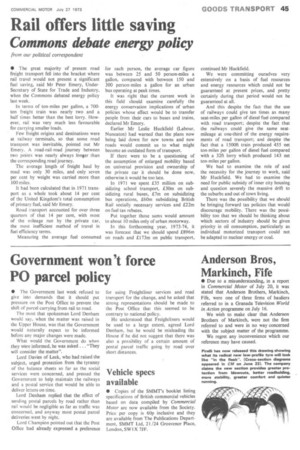Rail offers little saving
Page 47

If you've noticed an error in this article please click here to report it so we can fix it.
Commons debate energy policy
from our political correspondent
• The great majority of present road freight transport fell into the bracket where rail travel would not present a significant fuel saving, said Mr Peter Emery, UnderSecretary of State for Trade and Industry, when the Commons debated energy policy last week.
In terms of ton-miles per gallon, a 700ton freight train was nearly two and a half times better than the best lorry. However, rail was very much less favourable for carrying smaller loads.
Few freight origins and destinations were at railway terminals, so that some road transport was inevitable, pointed out Mr Emery. A road-rail-road journey between two points was nearly always lOnger than the corresponding road journey.
The average length of freight haul by road was only 30 miles, and only seven per cent by weight was carried more than 100 miles.
It had been calculated that in 1971 transport as a whole took about 14 per cent of the United Kingdom's total consumption of primary fuel, said Mr Emery.
Road transport accounted for over three quarters of that 14 per cent, with most of the mileage run by the private car, the most inefficient method of travel in fuel efficiency terms.
Measuring the average fuel consumed for each person, the average car figure was between 25 and 50 person-miles a gallon, compared with between 150 and 300 person-miles a gallon for an urban bus operating at peak times.
It was right that the current work in this field should examine carefully the energy conservation implications of urban policies whose effect would be to transfer people from their cars to buses and trains, declared Mr Emery.
Earlier Mr Leslie Huckfield (Labour, Nuneaton) had warned that the plans now being laid down for new towns and new roads would commit us to what might become an outdated form of transport.
If there were to be a questioning of the assumption of enlarged mobility based on universal provision and ownership of the private car it should be done now, otherwise it would be too late.
In 1971 we spent £35 million on subsidizing school transport, £30m on subsidizing rural buses, £7m on subsidizing bus operations, £60m subsidizing British Rail socially necessary services and £22m on fuel tax rebates.
Put together those sums would amount to about 10 miles only of urban motorway.
In this forthcoming year, 1973-74, it was forecast that we should spend 1896m on roads and £173m on public transport, continued Mr Huckfield.
We were committing ourselves very extensively on a basis of fuel resources and energy resources which could not be guaranteed at present prices, and pretty certainly during that period would not be guaranteed at all.
And this despite the fact that the use of railways could give ten times as many seat-miles per gallon of diesel fuel compared with road transport; despite the fact that the railways could give the same seatmileage at one-third of the energy requirements of road transport; and despite the fact that a 1500ft train produced 455 net ton-miles per gallon of diesel fuel compared with a 32ft lorry which produced 143 net ton-miles per gallon.
We had to examine the role of and the necessity for the journey to work, said Mr Huckfield. We had to examine the need for public subsidy of inner city housing and question severely the massive drift to the suburbs and out of town living.
There was the possibility that we should be bringing forward tax policies that would discourage mobility. There was the possibility too that we should be thinking about which sectors of industry should be given priority in oil consumption, particularly as individual motorized transport could not be adapted to nuclear energy or coal.
























































































































































